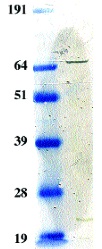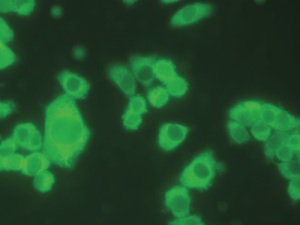ATS is pleased to present a polyclonal antibody specific for ChAT protein. Choline acetyltransferase (ChAT) catalyzes the synthesis of the neurotransmitter acetylcholine (ACh) from choline and acetyl-CoA in cholinergic neurons. ChAT serves as a specific marker for cholinergic neurons in both the peripheral and central nervous systems. Dysfunction of cholinergic neurons underlies aspects of clinical symptoms found in neurological and psychiatric disorders such as Alzheimer’s disease, Down and Rett syndromes.
The peptide sequence used for immunization has a high degree of homology between rat, human, mouse and pig. We have demonstrated the specificity of anti-ChAT by western blot analysis (Fig. 1) and immunohistochemistry (Figs. 2, 3). Anti-ChAT detects ChAT protein in cholinergic neurons of rat spinal cord, forebrain (Fig. 3) and PC12 cells (Fig. 2). Due to the fact that our ChAT antibody has a very high titer (1:5,000,000 dilution in ELISA and 1:2000-4000 in immuohistochemistry), it is provided as whole sera in 50% glycerol (Cat. #AB-N34). An affinity purified form of anti-ChAT is also available (Cat. #AB-N34AP).

Figure 1.
Lane 1: Molecular weight standards (Novex, See-Blue)
Lane 2: 25 mg of PC12 whole cell extract probed with AB-N34 at 1:2000 dilution.

Figure 2. Fluorescent staining of endogenous ChAT in cytoplasm of PC12 cells.
Dr. Majid Pajouh, Advanced Targeting Systems, San Diego, CA.

Courtesy of Dr. Ronald G. Wiley. and Robert Kline at Vanderbilt University, Nashville, TN.
